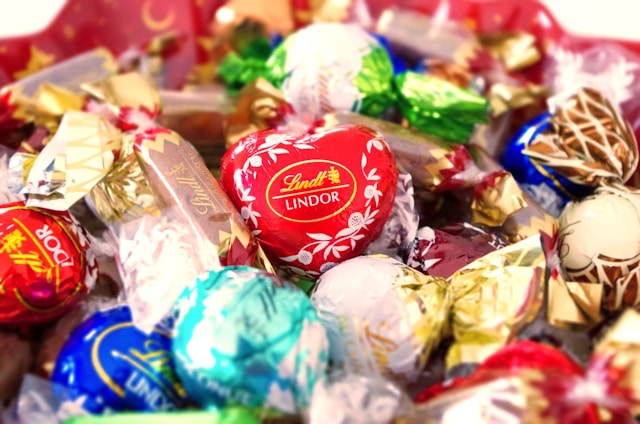
Is chocolate a type of candy?
It’s a simple question, but the answer is anything but.
Some claim chocolate absolutely is candy, while others insist the sweet treat is a category all its own.
We set out to settle the debate by taking a closer look at chocolate’s definition, history, and perceptions.
Stay with us as we take a deep dive into this tasty mystery.
What Does ‘Candy’ Mean?
Before we can even begin deciding where chocolate fits into the equation, we have to define candy. What is candy, anyway?
Most dictionaries describe candy to some extent or another as a sweet treat made from sugar or syrup that’s often combined with flavors, colorings, and other ingredients. Popular candy varieties include lollipops, gummies, and caramels.

Candy usually has a high amount of sugar, perfectly designed for quick, sugary pleasure. Candies also have a playful reputation, with popular brands transporting consumers back to their childhood days.
What does candy mean to you? Is it all about sugar, or does texture and purpose play a role? Is chocolate a candy?
Does chocolate’s complex flavors and air of sophistication make it different from candy? How do you personally classify chocolate?
A Brief History of Chocolate
Do you know the history of chocolate?
The sweet treat we know today traces its roots to Mesoamerica. Mayans and Aztecs revered the bitter, spiced drink called cacao. This early iteration of chocolate was a far cry from the sweet confections we now enjoy. Its uses even extended beyond food. Early Americans used it in rituals since they believed it held medicinal qualities.
What changed?
European colonization brought sugar to the mix, and the combination began to evolve into a treat. Innovations in the 19th century saw chocolate molded into solid bars. That paved the way for mass production.
Since sugar played such a pivotal role in the development of modern chocolate, it’s easy to see why you might consider it a type of candy. But its history signals a deeper culinary identity all its own.
Where Chocolate and Candy Overlap
At a glance, chocolate appears to fit the candy mold. After all, it’s sweet, and it’s often packaged in bite-sized portions. It’s sold right alongside other sugary treats. Go to any grocery store, convenience market, or even movie theaters, and you’ll find chocolate options right next to gummies, hard candies, and licorice.
Plus, chocolate bars are commonly known as “candy bars.”
Chocolate is also often combined with popular candies. You might enjoy chocolate-covered caramels, nougat-filled bars, or candy-coated milk chocolate pieces. Products like these only further blur the line between chocolate and traditional candy – so much so that it’s all the more difficult to draw a firm boundary.
So, chocolate is sold and enjoyed like candy. Why is there even a question as to its classification? Does chocolate have other unique qualities that set it apart from other sugary confections?
Chocolate In Its Own Category
For so many people, there’s no question if chocolate can stand alone as its own category apart from candy. They treat gourmet chocolates, for example, with the same reverence as fine wine or artisanal cheese. This type of chocolate boasts a complex flavor profile featuring bitterness, nuttiness, or even floral notes. The taste far surpasses your typical sugary sweetness.
Chocolate’s versatility also sets it apart from candy. It’s used in desserts, drinks, and even savory dishes. Candy, however, doesn’t often cross into other culinary worlds. That’s why some people argue that chocolate deserves its own space among sweet treats.
Chocolate is also marketed differently than candy. High-end brands promote themes like luxury and exclusivity so their products are separate from candy and its playful image. That distinction only reinforces the idea that chocolate is so much more than just another sugary concoction.
Perspectives Around the World
What do people around the world think when it comes to chocolate and candy? Opinions vary depending on where you are.
Belgium is known around the world for its gourmet chocolates. People there see creating chocolate as a craft, and they purchase it from speciality shops rather than a candy aisle. Swiss chocolate – also beloved worldwide – focuses on only the highest-quality ingredients, which only further sets it apart from mass-produced candy.

That’s not the same perception everywhere, however.
In countries like Japan, chocolate is a part of the overall candy culture, and a wide variety of colorful, seasonal options are perfect for gifting. It only goes to show that chocolate’s classification isn’t based only on its ingredient, but on how it’s perceived and consumed.
Ask 20 people in your own community if chocolate is candy, and you’ll see that opinions differ even in the same culture. For example, a child might think of chocolate as candy while a chocolatier sees it as an artform. To say nothing else, chocolate has a complex identity.
Chocolate in Candy Production
To further complicate the question of whether chocolate is candy, one confection is often an ingredient in the other.
Many iconic candies rely on chocolate for their appeal. Think about it, there’s a marked difference between a Reese’s Peanut Butter Cup and a peanut butter sandwich. Other popular examples are chocolate-covered almonds and chocolate-dipped strawberries. Each of these treats are undeniably candy, but they wouldn’t be the same without the chocolate.
The overlap of chocolate and candy makes it hard to definitely categorize chocolate. Sure, it stands out as a more refined snack, but it’s also a key player in the candy industry. So, is chocolate special, or is it defined by its association with candy?
Is Chocolate Candy to You?
How about you?
When you think of candy, does chocolate come to mind?
Or, do you put it in a league unto its own?
If you’re still not sure, consider how you consume and enjoy chocolate. Is it a casual, playful treat like candy, or is chocolate something richer?
Imagine you’re biting into a delectable truffle or a scrumptious bar of dark chocolate. Does it feel like you’re eating candy? Your answer probably depends on your perception of chocolate’s role in your own life.
Where Does Chocolate Stand?
So, is chocolate candy?
It’s sweet, versatile, and culturally significant. Those qualities blur the line between candy and something more sophisticated.
It doesn’t matter if you see chocolate as candy or in a category all its own. Regardless, chocolate is undeniably one of life’s sweetest pleasures.
Either way, chocolate is obviously one of life’s sweetest pleasures.
Whatever your label, you just cannot deny chocolate’s universal appeal. Now go ahead and have a piece of chocolate. Candy or not, it’s always a treat!

Leave a Reply
You must be logged in to post a comment.